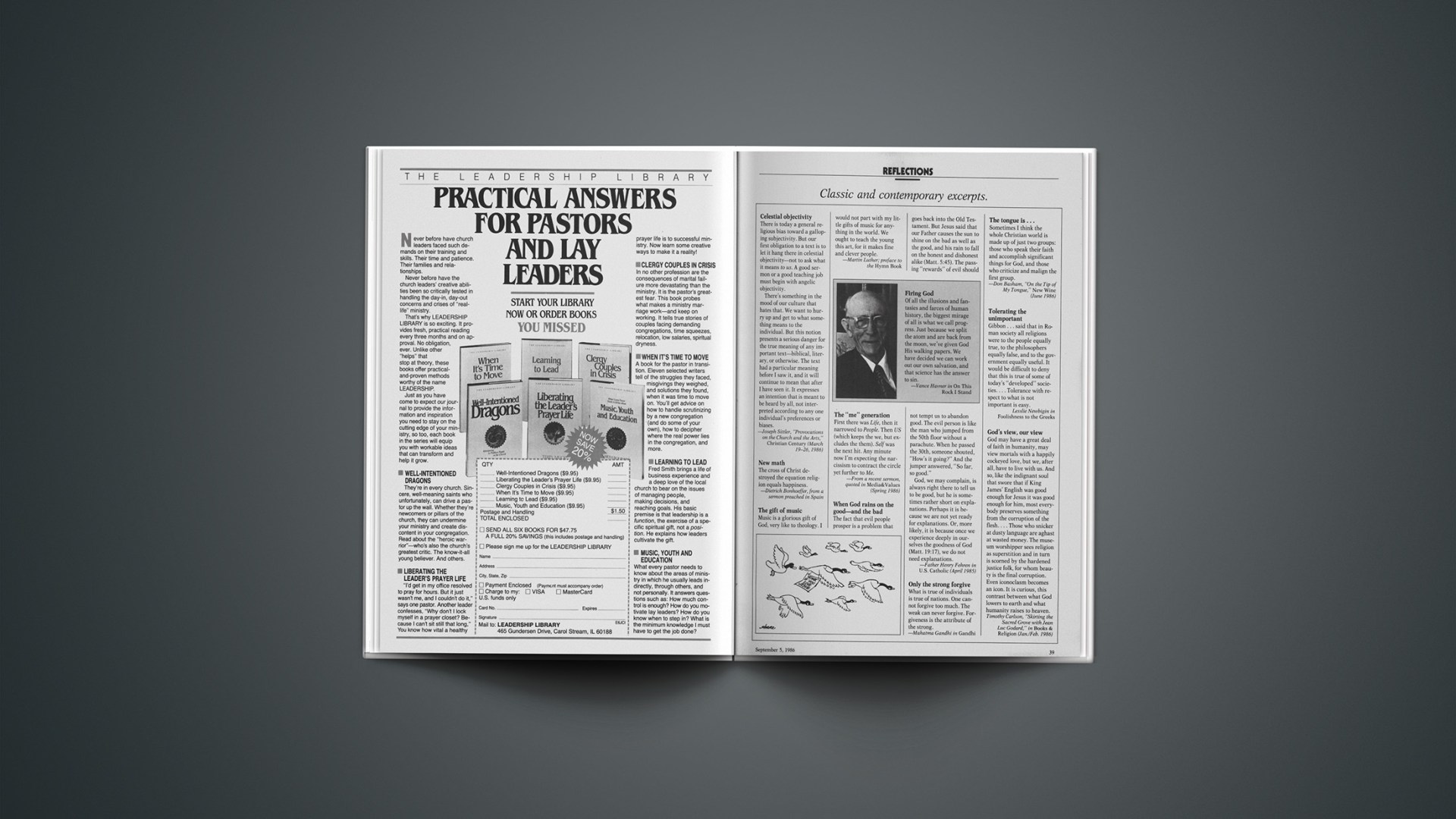Classic and contemporary excerpts
Celestial Objectivity
There is today a general religious bias toward a galloping subjectivity. But our first obligation to a text is to let it hang there in celestial objectivity—not to ask what it means to us. A good sermon or a good teaching job must begin with angelic objectivity.
There’s something in the mood of our culture that hates that. We want to hurry up and get to what something means to the individual. But this notion presents a serious danger for the true meaning of any important text—biblical, literary, or otherwise. The text had a particular meaning before I saw it, and it will continue to mean that after I have seen it. It expresses an intention that is meant to be heard by all, not interpreted according to any one individual’s preferences or biases.
—Joseph Sittler, “Provocations on the Church and the Arts,” Christian Century (March 19–26, 1986)
New Math
The cross of Christ destroyed the equation religion equals happiness.
—Dietrich Bonhoeffer, from a sermon preached in Spain
The Gift Of Music
Music is a glorious gift of God, very like to theology. I would not part with my little gifts of music for anything in the world. We ought to teach the young this art, for it makes fine and clever people.
—Martin Luther; preface to the Hymn Book
Firing God
Of all the illusions and fantasies and farces of human history, the biggest mirage of all is what we call progress. Just because we split the atom and are back from the moon, we’ve given God His walking papers. We have decided we can work out our own salvation, and that science has the answer to sin.
—Vance Havner in On This Rock I Stand
The “Me” Generation
First there was Life, then it narrowed to People. Then US (which keeps the we, but excludes the them). Self was the next hit. Any minute now I’m expecting the narcissism to contract the circle yet further to Me.
—From a recent sermon, quoted in Media&Values (Spring 1986)
When God Rains On The Good—And The Bad
The fact that evil people prosper is a problem that goes back into the Old Testament. But Jesus said that our Father causes the sun to shine on the bad as well as the good, and his rain to fall on the honest and dishonest alike (Matt. 5:45). The passing “rewards” of evil should not tempt us to abandon good. The evil person is like the man who jumped from the 50th floor without a parachute. When he passed the 30th, someone shouted, “How’s it going?” And the jumper answered, “So far, so good.”
God, we may complain, is always right there to tell us to be good, but he is sometimes rather short on explanations. Perhaps it is because we are not yet ready for explanations. Or, more likely, it is because once we experience deeply in ourselves the goodness of God (Matt. 19:17), we do not need explanations.
—Father Henry Fehren in U.S. Catholic (April 1985)
Only The Strong Forgive
What is true of individuals is true of nations. One cannot forgive too much. The weak can never forgive. Forgiveness is the attribute of the strong.
—Mahatma Gandhi in Gandhi
The Tongue Is …
Sometimes I think the whole Christian world is made up of just two groups: those who speak their faith and accomplish significant things for God, and those who criticize and malign the first group.
—Don Basham, “On the Tip of My Tongue,” New Wine (June 1986)
Tolerating The Unimportant
Gibbon … said that in Roman society all religions were to the people equally true, to the philosophers equally false, and to the government equally useful. It would be difficult to deny that this is true of some of today’s “developed” societies.… Tolerance with respect to what is not important is easy.
Lesslie Newbigin in Foolishness to the Greeks
God’S View, Our View
God may have a great deal of faith in humanity, may view mortals with a happily cockeyed love, but we, after all, have to live with us. And so, like the indignant soul that swore that if King James’ English was good enough for Jesus it was good enough for him, most everybody preserves something from the corruption of the flesh.… Those who snicker at dusty language are aghast at wasted money. The museum worshipper sees religion as superstition and in turn is scorned by the hardened justice folk, for whom beauty is the final corruption. Even iconoclasm becomes an icon. It is curious, this contrast between what God lowers to earth and what humanity raises to heaven.
Timothy Carlson, “Skirting the Sacred Grove with Jean Luc Godard,” in Books & Religion (Jan./Feb. 1986)










